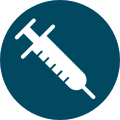Sexually Transmitted Infections (STIs) affect people of all ages, backgrounds, and from all walks of life. STIs are most common among people ages 15 to 24. However, anyone who is sexually active can get an STI.
It is important to get tested for STIs and to get treated if you have an STI. Untreated STIs can cause serious health problems.
See our 2023 Sexually Transmitted Infections report to learn about STI trends in Kitsap County.

Disease Information
Communicable diseases are diseases that spread between people or animals. Click on the buttons below to learn about specific diseases. For more disease information, visit the CDC's health topics index.

Our vision:
A safe and healthy Kitsap County for all.
Communicable Disease Data Dashboards
This report displays respiratory virus trends for Kitsap County based on data from healthcare facilities and laboratory testing. The Respiratory Illness Report is published weekly during respiratory illness season (typically fall and winter months) and published monthly when respiratory illness activity is low. You can subscribe to receive this report by email or text.
What to know about STIs
STIs are most often spread through sexual contact involving the genitals, mouth, or anus.
STIs often have no symptoms or mild symptoms. You can have an STI and spread it to others without knowing you are infected. A pregnant parent can pass an STI to their infant during pregnancy or childbirth.
You can protect yourself and your partners by getting tested for STIs and getting treatment if you have an STI.
You can reduce your risk for STIs by limiting the number of sexual partners you have and by using condoms correctly during sex.
Vaccines are recommended for some people to prevent hepatitis B and HPV.
Our services
Kitsap Public Health does not offer routine STI testing to the public. If you need help getting testing or treatment, please call us at 360-728-2318.
Visit our HIV Medical Case Management page to learn about our HIV case management services.
More resources
Sexually Transmitted Infections | Washington State Dept. of Health

Using a mobile device? These data dashboards cannot be viewed on a phone or tablet. Please visit this webpage from a computer.
Rabies Data
Sexually Transmitted Infections
Healthcare Provider Resources
Looking for more healthcare guidance or resources? Visit our Provider Resources page.






.png)
